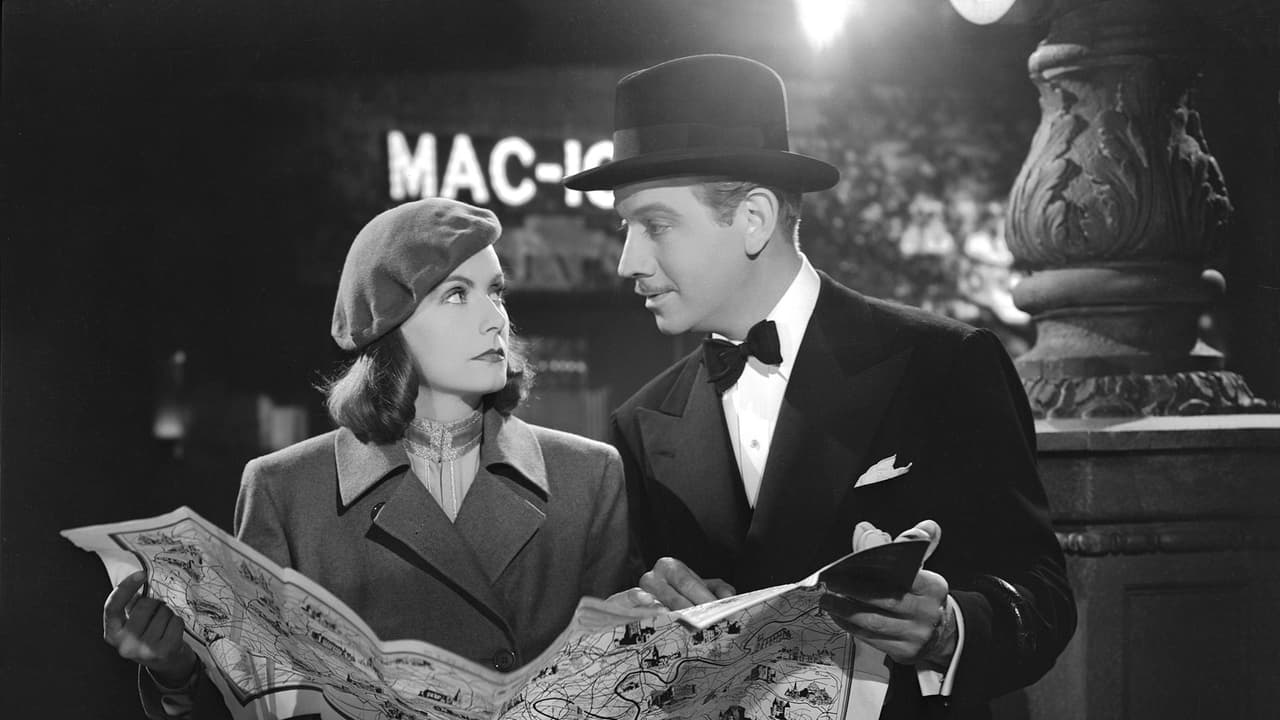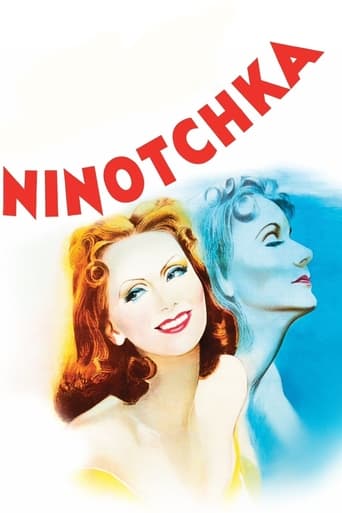



How wonderful it is to see this fine actress carry a film and carry it so beautifully.
View MoreI have absolutely never seen anything like this movie before. You have to see this movie.
View MoreThe plot isn't so bad, but the pace of storytelling is too slow which makes people bored. Certain moments are so obvious and unnecessary for the main plot. I would've fast-forwarded those moments if it was an online streaming. The ending looks like implying a sequel, not sure if this movie will get one
View MoreThe film's masterful storytelling did its job. The message was clear. No need to overdo.
View MoreFor some reason, Greta Garbo is elevated beyond her peers. While her mysterious ethos is certainly the stuff of legend (sort of like James Dean and his much too early death), part of her attraction is that she was so inaccessible. I think she was a wonderful actress and in this part she plays it to the hilt, but all this hue and cry over the sullen beauty laughing begs the creation of a godhead. This is a comedy about Russian collectivists becoming enamored with the capitalist world they are supposed to disdain. At the center are some priceless jewels. When Ninotchka comes in to set things straight, it isn't long before she falls for a guy and begins to doubt herself. She had a wonderfully expressive face, and, of course, that sultry voice. This is a fun film, but it is granted its status in many cases because of her unapproachability in real life.
View MoreCasablanca has long been my favorite movie. Ninotchka has similar elements - memorable lines, romance, political overtones and satire , made 3 years earlier. Greta's face shows emotion even when she's not showing emotion. She foreshadows Spock! Her glance at an opulent store display speaks volumes. When the does laugh, the screen virtually splinters. Sally Field and Robert Osborne introduced this movie on TCM recently. Sally's insights are special, pointing out the comedic flair of Greta in several scenes, as when she's "executed". Communism and capitalism take their share of abuse; the contrast is portrayed and parodied. Greta even mentions "social justice", truly a modern leftist buzzword and a Marxist concept. Ninotchka is fun from the first scene to closing credits, with one last parting joke...to be interpreted in a number of ways. Melvin Douglas is superb, a Chevalier/Cary Grant type. Ina Claire was a stage legend and held up well versus Douglas and Garbo, high praise indeed. The 3 minute scene with Greta and Bela Lugosi is priceless. I gotta make room in my top 10 for Ninotchka; like her, I continue to crack up thinking back on it.
View MoreA stern Russian woman (Greta Garbo) sent to Paris on official business finds herself attracted to a man (Melvyn Douglas) who represents everything she is supposed to detest.The way Soviet Russia is portrayed here is quite strange. We have Ninotchka saying an old man looks "sad" and should not be working, she has a strict adherence to custom and regulation. And censorship completely blocks out the letters of friends. While I do not think this is completely off-base, surely this is exaggerated. (Of course, in some ways, the situation was probably far worse.) I love that this has a Billy Wilder script. Wilder learned a lot from director Lubitsch and went on to direct some of the greatest films out there (I would argue that Wilder surpassed Lubitsch in greatness).We also get a great appearance (although all too small) of the legendary Bela Lugosi.
View MoreNINOTCHKA (Metro-Goldwyn-Mayer, 1939), directed by Ernst Lubitsch, ranks one of the finest comedies to emerge in what's regarded to be Hollywood's greatest year, 1939. It was also that very year where certain top-rated stars, having gone through a declining period, would recapture the status they once acquired some time ago. The legendary Greta Garbo happened to be one of them. After playing tragic heroines for MGM dating back to the silent era of 1926, it was time for Garbo to either retire following her last screen appearance of CONQUEST (1937), or do something completely different. A Garbo musical might have been interesting, but quite unlikely. A western? Not quite. Garbo in pistols and petticoats would definitely not be her style, though it did work for Marlene Dietrich in DESTRY RIDES AGAIN. A murder mystery? Perhaps. Or at least another love story might suffice? The next best thing to reinventing the Garbo image turned out to be a comedy. Screwball comedies were highly successful and common place during the latter half of the thirties. For this comedy, however, it had to be both funny and agreeable to public taste. Funny and agreeable it was. Under stylish direction from the man known for his "Lubitsch touch," and excellent scripting by Charles Bracket, Billy Wilder and Walter Reich, the comedy in question resulted to the title character bearing the Russian name of NINOTCHKA.Opening title: "This picture takes place in Paris in those wonderful days when a siren was a brunette and not an alarm - and if a Frenchman turns out the light, it was not on account of an air raid!" The story opens with Russian comrades, Buljanoff (Felix Bressart), Iranoff (Sig Rumann) and Kopakski (Alexander Granach), in Paris, on a mission from the Soviet Government to sell jewels once belonging to the Grand Duchess Swana (Ina Claire) with the money used for farm machinery. Their assignment is soon forgotten as the trio enjoy themselves in the company of beautiful barmaids. Also at the luxurious hotel is Alexis Rakonin (Gregory Gaye), a Russian count posing as a waiter, who informs the Grand Duchess of their activities. Swana then has her lover, Count Leon D'Algout (Melvyn Douglas), to assist by both filing a court injunction to prevent the selling of the jewels as well as showing the comrades a good time in order to forget why they're in Paris in the first place. Due to the long delay, the Soviet sends Nina Ivanovna Yakushova, better known as Ninotchka (Greta Garbo), to investigate. Having met Ninotchka at a crosswalk, Leon, unaware of her identity, immediately becomes fascinated by her. During her stay in Paris, Leon does everything to entertain her, from escorting her to the top of the Eiffel Tower to endless attempts in trying to make her laugh. When Ninotchka finally transforms into a new woman, trading her beret for a modern hat, she, too, forgets her assignment by concentrating on Leon. When Ninotchka mysteriously returns to Russia, Leon tries to follow her there, but is unable to obtain a Visa.For Garbo's introduction in American comedy, NINOTCHKA comes no better than this. She earned a well deserved Academy Award nomination for her performance. What makes NINOTCHKA work so well is the way Garbo delivers her comedy lines, in the same manner of her dramatic roles. Enacting it in a straightforward manner with no attempts of being funny is the secret to the hilarity. The more serious she is, the funnier she becomes. Of the many classic lines delivered here, with one being a little "in-joke" pertaining to Garbo's classic tag line of "wanting to be alone," the one that should get honorable mention is, "Do you want to see my wound." For Garbo's male co-star, Melvyn Douglas proved to be a most logical choice. His most classic scene comes as he helps his leading lady fulfill her much publicized slogan, "Garbo laughs!" She's laughed before on screen, but never so hysterically. A pity the Garbo-Douglas reunion comedy of TWO FACED WOMAN (1941) didn't earn the same reputation as NINOTCHKA. The now forgotten Ina Claire, better known more for her theatrical than screen performances, gives a good account of herself as the Duchess. It's a wonder how the sophisticated Genevieve Tobin might have done had she assumed that very same role. Horror movie fans will be surprised in finding the fourth-billed Bela Lugosi appearing as the Russian Commissar Razinin. Even more surprising how his one and only scene opposite Garbo to not only come very late into the 111 minute story, but one lasting a little less three minutes!As much as NINOTCHKA has been imitated and recycled throughout the years, only the musical remake, SILK STOCKINGS (MGM, 1957) starring Fred Astaire and Cyd Charisse (Ninotchka) comes close in recapturing the success of the original. Distributed to video cassette in the mid 1980s and later onto DVD, viewers can capture a glimpse of the legendary Garbo laughing (and showing off her wound) in one of cable TV's many broadcasts on Turner Classic Movies. (**** comrades)
View More